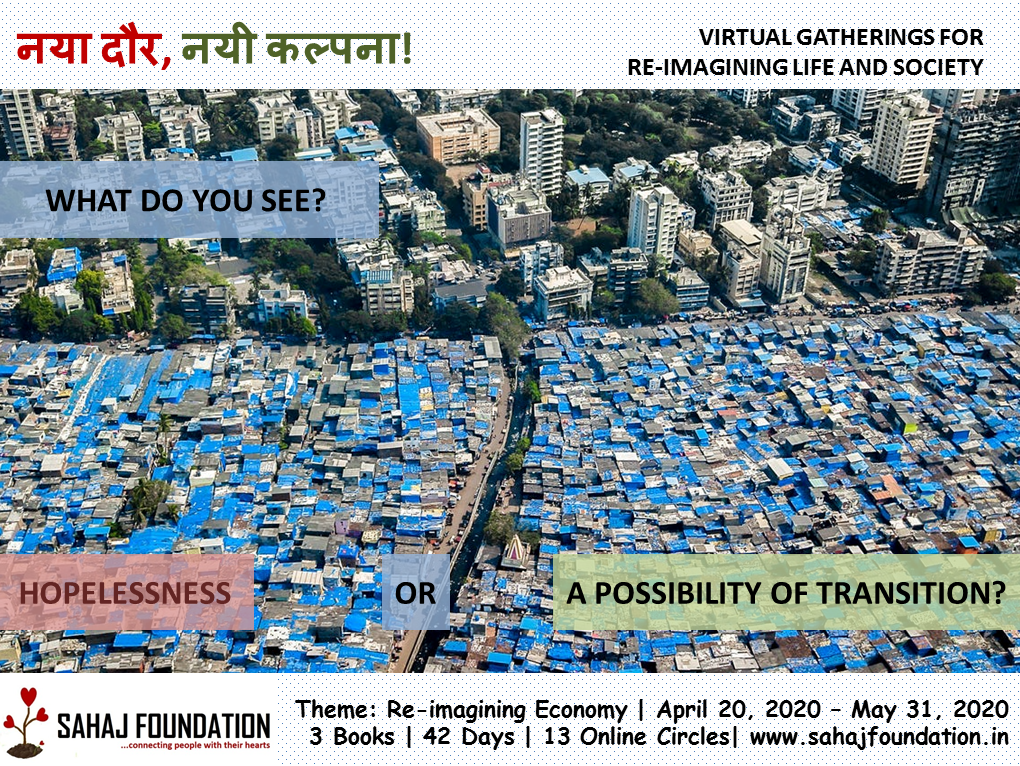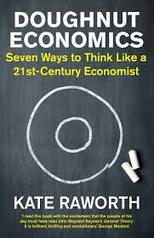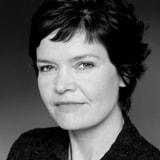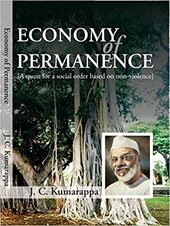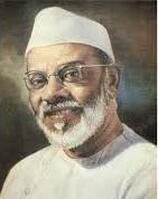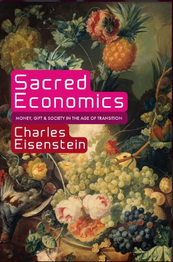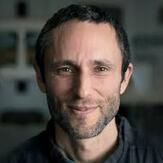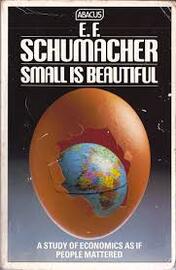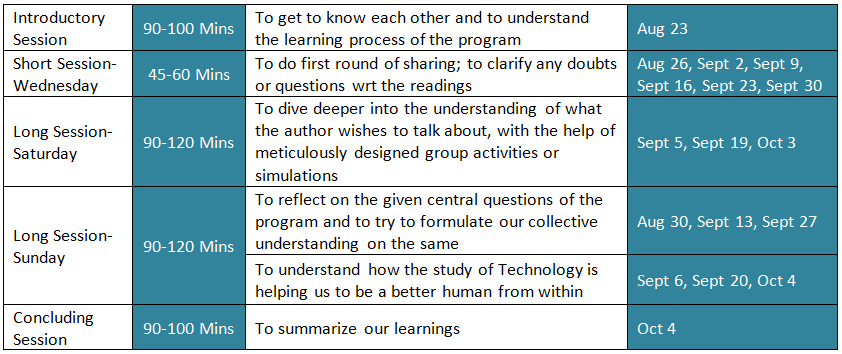नया दौर, नयी कल्पना!
PROGRAM INTRODUCTION
We are passing through an unprecedented event in our life. An event that is full of suffering, and yet equally full of possibilities of miracles waiting to happen in next few weeks or months. It is more like a transition from one way of living to another; a transition that many of us were already hoping to witness in our lifetimes; a transition that is bound to be painful in its process while it may lead us to a more beautiful world by the end.
Now the question is, are we prepared for a more beautiful world? Do we even have an imagination or understanding of what kind of a world we wish to live in? What kind of systems, or structures, would we like to design while we arrive in that space? Or, do we simply wish to continue with the systems that we already have? If yes, would we then eventually not get to the same kind of lifestyle that created this pandemic at first place?
Einstein once said, “We cannot solve our problems with the same thinking we used to create them.” Likewise, we cannot hope to not have a crisis in future if we continue to live by the systems that have created this pandemic at first place. We will have to imagine a different set of systems that are not rooted in the pursuit of unlimited linear growth and concentration of power. We will have to imagine a whole new way of understanding our lives, our communities and our cultures. We will have to first empty our minds by unlearning that we already know, so as to give space to many fresh possibilities to seep in. And, we will have to do it all together for an effective timely transition!
‘नया दौर, नयी कल्पना’ invites you to one such endeavor. The program invites you all to come together, in virtual gatherings or circles, and simply start reading the books of those visionaries who have dared to point us to different directions. These visionaries are of the present times and of the past, and they come from different backgrounds, different disciplines and different cultures. Our effort, collectively, would be to use their work as our guiding light, reflect on the concepts that they have proposed, brainstorm their advantages as well as limitations, understand their possible impact on the inner growth of ‘the self’ and ‘the collective’, and finally critically analyze the practicality of the proposals for their actual on-ground implementation. In this whole process, we shall also seek the support of meditation sessions, videos/talks and a few group activities to deepen our experience.
Now the question is, are we prepared for a more beautiful world? Do we even have an imagination or understanding of what kind of a world we wish to live in? What kind of systems, or structures, would we like to design while we arrive in that space? Or, do we simply wish to continue with the systems that we already have? If yes, would we then eventually not get to the same kind of lifestyle that created this pandemic at first place?
Einstein once said, “We cannot solve our problems with the same thinking we used to create them.” Likewise, we cannot hope to not have a crisis in future if we continue to live by the systems that have created this pandemic at first place. We will have to imagine a different set of systems that are not rooted in the pursuit of unlimited linear growth and concentration of power. We will have to imagine a whole new way of understanding our lives, our communities and our cultures. We will have to first empty our minds by unlearning that we already know, so as to give space to many fresh possibilities to seep in. And, we will have to do it all together for an effective timely transition!
‘नया दौर, नयी कल्पना’ invites you to one such endeavor. The program invites you all to come together, in virtual gatherings or circles, and simply start reading the books of those visionaries who have dared to point us to different directions. These visionaries are of the present times and of the past, and they come from different backgrounds, different disciplines and different cultures. Our effort, collectively, would be to use their work as our guiding light, reflect on the concepts that they have proposed, brainstorm their advantages as well as limitations, understand their possible impact on the inner growth of ‘the self’ and ‘the collective’, and finally critically analyze the practicality of the proposals for their actual on-ground implementation. In this whole process, we shall also seek the support of meditation sessions, videos/talks and a few group activities to deepen our experience.
Disclaimer: Please do not expect to have any expert or professional of Economics to be with us during the online gatherings. We shall be on our own, learning from each other while trying to apply our common sense to test the practicality or relevance of the proposed concepts.
THE BOOKS
The three books that we aim to cover for the first version of this program shall come out of the following choices (to be collectively decided by the participants themselves during the very first online circle):
|
Kate Raworth, an oxford academic, is a renegade economist focused on exploring the economic mindset needed to address the 21st century’s social and ecological challenges, and is the creator of the Doughnut of social and planetary boundaries.
In Doughnut Economics- Seven Ways to Think Like a 21st-Century Economist, Kate Raworth lays out the seven deadly mistakes of economics and offers a radical re-envisioning of the system that has brought us to the point of ruin. Moving beyond the myths of ‘rational economic man’ and unlimited growth, Doughnut Economics zeroes in on the sweet spot: a system that meets all our needs without exhausting the planet. |
|
J. C. Kumarappa was an Indian economist and a close associate of Mahatma Gandhi. A pioneer of rural economic development theories, Kumarappa is credited for developing economic theories based on Gandhism – a school of economic thought he coined "Gandhian economics." In his words, “Nature enlists and ensures the co-operation of all its units, each working for itself and in the process helping other units to get along their own too -- the mobile helping the immobile, and the sentient the insentient. Thus all nature is dovetailed together in a common cause. Nothing exists for itself. When this works out harmoniously and violence does not break the chain, we have an Economy of Permanence.”
|
|
Sacred Economics- Money, Gift and Society in the Age of Transition traces the history of money from ancient gift economies to modern capitalism, revealing how the money system has contributed to alienation, competition, and scarcity, destroyed community, and necessitated endless growth. This book is about how the money system will have to change-and is already changing—to embody this transition. A broadly integrated synthesis of theory, policy, and practice, Sacred Economics explores avant-garde concepts of the New Economics, including negative-interest currencies, local currencies, resource-based economics, gift economies, and the restoration of the commons. Author Charles Eisenstein also considers the personal dimensions of this transition, speaking to those concerned with "right livelihood" and how to live according to their ideals in a world seemingly ruled by money.
|
|
In 'Small is Beautiful-A Study of Economics as if people mattered', Oxford economist E. F. Schumacher provides an enlightening study of our economic system and its purpose, challenging the current state of excessive consumption in our society. Offering a crucial message for the modern world struggling to balance economic growth with the human costs of globalisation, the book puts forward the revolutionary yet viable case for building our economies around the needs of communities, not corporations.
This book is listed as ‘One of the 100 most influential books published since World War II’ by The Times Literary Supplement. |
THE PROCESS
For the first version of this program, we shall have a set of three books on the theme ‘Re-imagining Economy’. This version shall continue for a period of 42 days- 14 days for each book- with following set of online gatherings:
In addition to the above mentioned compulsory sessions, we may also choose to have a few optional sessions to cover more ideas/sharings as per the program requirement. Also, the participants shall have an option to ask for a one-on-one session with the facilitator if they wish to discuss about their personal or professional life situations in person.
The possible timings of these online circles shall be either an evening slot (5:00 – 6:30 PM IST) or a late evening slot (8:00 – 9:30 PM IST) (to be collectively decided by the participants).
The timeline of the program has been designed in a way so as to keep our second and forth circle on the weekends (Saturday or Sunday). However, the participants shall have to manage their schedule for the first (Day 1) and third circle (Day 10) during the working days. We shall be flexible in deciding the timings of the calls as per group’s requirements during the course of the program.
Kindly note that this whole program requires you to devote approximately 90 minutes every day to continue your reading of the books on your own. Therefore, please be a part of this adventure only if you are fully committed to the cause from within.
BATCH SIZE
Around 12-15 participants. We wish to a have a small group with more time per participant.
ELIGIBILITY CRITERIA
Anyone- of any age, gender, nationality, background, work experience- is invited to participate in this program as we wish to have as much diversity as possible.
All we would require from our side is for you to have an interest for reading books, a spark to find a new way of living and an intention to dive deeper into the possibilities of re-imagining the design of our present economy.
All we would require from our side is for you to have an interest for reading books, a spark to find a new way of living and an intention to dive deeper into the possibilities of re-imagining the design of our present economy.
APPLICATION PROCESS
Kindly use this link to fill the application form: www.sahajfoundation.in/application-form-for-ndnk
We may choose to speak to you over phone before finalizing your participation in this program.
We may choose to speak to you over phone before finalizing your participation in this program.
FINANCIALS
The suggested range of contribution is Rs 5,000- Rs 8,000. The participants are encouraged to contribute as per their heart and financial situation. The ones who are capable of contributing on higher side are encouraged to do so, as we also wish to accommodate a few individuals who are not in a position to contribute financially.
The charges shall cover facilitation for all 42 days that include 13 compulsory virtual sessions- 4 sessions per book as mention above on Day 1, 7, 10 and 13, optional sessions as per the requirement and one-on-one sessions.
The charges shall cover facilitation for all 42 days that include 13 compulsory virtual sessions- 4 sessions per book as mention above on Day 1, 7, 10 and 13, optional sessions as per the requirement and one-on-one sessions.
FREQUENTLY ASKED QUESTIONS (FAQs)
1. Is it just a book reading program?
No, it is not. The program aims to use three books as its guiding light while the sessions aim to go deeper into re-imagining our present economy with a different value system. The sessions shall also focus on the personal growth of its participants.
2. Can I skip some online sessions?
It would be optional for you to participate in additional sessions that we may come up during to the course of the program. However, we would strongly suggest you to not skip any compulsory session (12+1 in total; 4 per book; 2 per week) as these sessions shall build upon each other.
3. Will the recordings of the gatherings be available?
No, the recordings shall not be available for later review. Kindly be present and fully attentive during the sessions.
4. Can I join the program in between say after a week from the beginning or so?
Though we would encourage you to join the whole program for its six week duration, it would be possible for you to join the program in-between either on May 4, 2020 (when second book reading starts) or on May 18, 2020 (when third book reading starts). Your joining shall however depend on the number of seats available.
5. What if I have already read any book(s) mentioned on the program page?
As already mentioned, this program is not only about reading books. The program aims to delve deeper into economy’s designs as well as personal growth. Therefore, we would encourage you to still consider your participation in this adventure.
6. Can I also suggest any book from my side to be taken up for the reading?
Yes, you can, in the very first session while we would be collectively deciding on our final three books out of given options. The final decision shall however depend on the consent of the whole group.
7. Will you buy these books on my behalf?
No, we shall provide you with the soft copies of the books if they are available in public domain. Otherwise, we shall direct you to a book sharing app that provides these books for free reading. If you prefer to have physical copies of these books for reading, we would encourage you to kindly buy the books on your own.
8. If there are only four online circles per book (in two weeks), how am I supposed to give 90 minutes per day to this program?
The online circles are more about sharing and learning from each other’s reflections. You would be required to go through the whole book on your own by devoting dedicated time for the same on daily basis. Also, kindly note that you are encouraged to read slowly and spend a lot more time doing self-reflection.
9. What are the other possible timelines for the gatherings?
If the evening slots do not work out, we may choose to have our sessions in the daytime preferably with these slots: (11:00 – 12:30 AM), (02:00 – 03:30 PM).
10. Are there going to be more versions of this program in future?
Yes, the program shall, in future, come with many other themes such as ‘Rethinking Money’, ‘Refreshing worldviews’, ‘Dissolving Governance’ etc.
No, it is not. The program aims to use three books as its guiding light while the sessions aim to go deeper into re-imagining our present economy with a different value system. The sessions shall also focus on the personal growth of its participants.
2. Can I skip some online sessions?
It would be optional for you to participate in additional sessions that we may come up during to the course of the program. However, we would strongly suggest you to not skip any compulsory session (12+1 in total; 4 per book; 2 per week) as these sessions shall build upon each other.
3. Will the recordings of the gatherings be available?
No, the recordings shall not be available for later review. Kindly be present and fully attentive during the sessions.
4. Can I join the program in between say after a week from the beginning or so?
Though we would encourage you to join the whole program for its six week duration, it would be possible for you to join the program in-between either on May 4, 2020 (when second book reading starts) or on May 18, 2020 (when third book reading starts). Your joining shall however depend on the number of seats available.
5. What if I have already read any book(s) mentioned on the program page?
As already mentioned, this program is not only about reading books. The program aims to delve deeper into economy’s designs as well as personal growth. Therefore, we would encourage you to still consider your participation in this adventure.
6. Can I also suggest any book from my side to be taken up for the reading?
Yes, you can, in the very first session while we would be collectively deciding on our final three books out of given options. The final decision shall however depend on the consent of the whole group.
7. Will you buy these books on my behalf?
No, we shall provide you with the soft copies of the books if they are available in public domain. Otherwise, we shall direct you to a book sharing app that provides these books for free reading. If you prefer to have physical copies of these books for reading, we would encourage you to kindly buy the books on your own.
8. If there are only four online circles per book (in two weeks), how am I supposed to give 90 minutes per day to this program?
The online circles are more about sharing and learning from each other’s reflections. You would be required to go through the whole book on your own by devoting dedicated time for the same on daily basis. Also, kindly note that you are encouraged to read slowly and spend a lot more time doing self-reflection.
9. What are the other possible timelines for the gatherings?
If the evening slots do not work out, we may choose to have our sessions in the daytime preferably with these slots: (11:00 – 12:30 AM), (02:00 – 03:30 PM).
10. Are there going to be more versions of this program in future?
Yes, the program shall, in future, come with many other themes such as ‘Rethinking Money’, ‘Refreshing worldviews’, ‘Dissolving Governance’ etc.
FACILITATOR'S PROFILE
Ashish Kumar
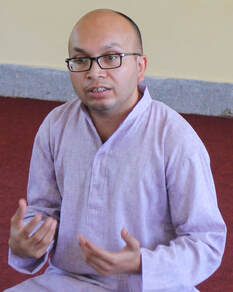
Ashish graduated from Indian Institute of Technology (IIT), Roorkee in the field of Electrical Engineering in 2009. Post studies, he pursued his corporate career for a few years before deciding to move on to his passion to work with rural communities. Since then, Ashish has lived in the villages of Gujarat and Himachal Pradesh and worked for many rural projects related to Education and Livelihood sector. Before founding Sahaj Foundation in 2013, he also worked with Indian Institute of Technology (IIT) Mandi to help set up their ‘Centre for Innovative Technologies in Himalayan Region’.
Presently, Ashish lives a simple and peaceful life in Bir village situated in Kangra District of Himachal Pradesh. He has chosen Education as his primary medium of service while he continues to explore more on organic farming and holistic healing with an aim to simplify his lifestyle and benefit the society as much as possible.
For past four years, Ashish has been conducting many dialogues and workshops on the theme of 'Rethinking Development'. He has so far facilitated such processes for hundreds of professionals and students. He strongly believes that there is a need to create spaces wherein people can develop their abilities to think critically and understand the world by using their own experiences. This online program is his another effort to do just that!
Presently, Ashish lives a simple and peaceful life in Bir village situated in Kangra District of Himachal Pradesh. He has chosen Education as his primary medium of service while he continues to explore more on organic farming and holistic healing with an aim to simplify his lifestyle and benefit the society as much as possible.
For past four years, Ashish has been conducting many dialogues and workshops on the theme of 'Rethinking Development'. He has so far facilitated such processes for hundreds of professionals and students. He strongly believes that there is a need to create spaces wherein people can develop their abilities to think critically and understand the world by using their own experiences. This online program is his another effort to do just that!
For more information, write to Ashish Kumar ([email protected]) or call him on +91 88948 93083

